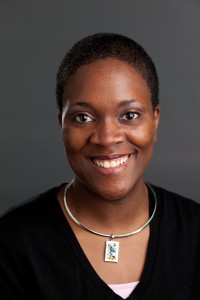Jo Ann Deasy is an ordained Covenant pastor currently serving as the director of institutional initiatives and student research at the Association of Theological Schools in Pittsburgh, PA.
 An article recently popped up on my Facebook newsfeed entitled, “Do Women Everywhere Suck at Their Jobs?” by Katy Waldman (Slate.com, Nov. 2013). Of course, I had to read it. Luckily the subheadings clued me in to the fact that this was not really about the lack of qualified women in the world. Instead, this article was about “the imposter syndrome.” The imposter syndrome is “the phenomenon by which high-achieving careerists feel unqualified for their jobs, regardless of the positive feedback they earn” and it is particularly prevalent among women.
An article recently popped up on my Facebook newsfeed entitled, “Do Women Everywhere Suck at Their Jobs?” by Katy Waldman (Slate.com, Nov. 2013). Of course, I had to read it. Luckily the subheadings clued me in to the fact that this was not really about the lack of qualified women in the world. Instead, this article was about “the imposter syndrome.” The imposter syndrome is “the phenomenon by which high-achieving careerists feel unqualified for their jobs, regardless of the positive feedback they earn” and it is particularly prevalent among women.
As I read the article, I was particularly struck by the research on how the imposter syndrome plays out in the workplace. Waldman cites studies that “show that female employees apologize more… because they have a lower threshold for thinking they’ve committed an offense. They give themselves duller performance reviews, even when their supervisors rate them more highly than their male peers…” and “that most women don’t even apply for positions unless they’re certain they meet 100 percent of the prerequisites. (Men, meanwhile, tend to send in their resumes if they possess a mere 60 percent of the job qualifications.)”
I remember seeing the imposter syndrome crop up regularly in the lives of women seminary students at North Park. Articulate, strong, capable women who would suddenly be filled with self-doubt in the pulpit or in an interview. Women who would not speak up in class, who would sell themselves short and seek positions they were overqualified for. And I began to reflect on how the imposter syndrome had effected my own life.
Despite always being near the top of my class in college and seminary, I never felt smart. I don’t think I spoke more than two words in class during my first three years of seminary. It didn’t help that I had been overlooked for several scholarships and awards because no one had bothered to look at my transcripts. But it was the internal doubt that was the most frustrating. I thought I had mostly gotten past all of that in my PhD program at Garrett only to have it crop up again as I was defending my dissertation, tears streaming down my face as I struggled to respond to basic questions, but the words would not come out. And again as I interviewed for a teaching position, having made it to the final interview, the only candidate, only to freeze up as some older male faculty members began challenging my basic Christian beliefs.
I almost didn’t apply for my current job as director of institutional initiatives and student research at the Association of Theological Schools. I didn’t think I was qualified. It turns out I am more than qualified. Actually my background, experience and education are just perfect for the position. But I couldn’t see that as I read through the job description. Even when others could.
So, how can you help women (and others) struggling with the imposter syndrome? First, we need to name it. Sociologist Jessica Collett writes, “Research shows that one of the best things we can do is name impostorism, to give students the sense that what they are experiencing is more common than they believe.” (From “feeling-like-a-fraud-youre-not-alone“)
Second, we need to give women clear feedback about their gifts and qualifications. All too often conversations around women pastors revolve around the controversy that might arise as they try to exercise their authority. People focus on biblical arguments about gender roles and women leaders. But women need more people to focus on their gifts and abilities, their potential, and to name that for them. To give them a reality check and stop letting them sell themselves short.
Third, we need to stop assuming that women are not ambitious or are not interested in a position just because they show doubts or don’t seem passionate enough. Every year the graduating students at North Park would interview with the superintendents for the Evangelical Covenant Church. I remember watching superintendents push male students to apply for more senior positions, solo pastorates, larger churches, but when female students showed doubts or concerns about various positions, superintendents and others assumed they were not interested. Often they were not pushed in the same way. When search committees interview women, they often walk away because women don’t seem passionate enough in the initial interview, but often it is just the imposter syndrome getting in the way. Women need people to push them, to advocate for them, to tell them, to tell churches, to tell anyone who will listen how qualified they are, that they are worthy of being hired.
Finally, for those of you who feel like imposters, feel encouraged. Apparently the imposter syndrome is most common among extremely talented and capable people.








Discovering What You Didn’t Know Was Missing
Filed under: Book & Commentary, Testimonies and Stories
Nilwona Nowlin currently serves as the Administrative Specialist for Governance for the ECC and is a member of the Christian Community Development Association and the Redbud Writers Guild. In her “spare time,” she teaches workshops about living successfully as an introvert. Nilwona is a member of the Kingdom Covenant Church (Chicago) launch team and randomly blogs about random things at thedreamerspeaks.
I’ve been reading leadership books for years, but it was only recently that I realized something: none of the books I’d been reading were written by women. If I broadened my definition of a “leadership book,” it might allow for the inclusion of a small handful of female authors. (And I haven’t even bothered to raise the issue of ethnicity.) I am naturally quite observant, but sometimes – like in this case – it takes me a while to notice a pattern. In other cases, I miss the pattern altogether.
Last week, I participated in the ECC Sankofa Journey, and experienced quite an eye-opening surprise: both of our drivers were black women. It wasn’t until I saw them that I realized I had never seen a female coach bus driver, let alone one who was a black female. (To add to our amazement, they were also sisters.) In all my experiences riding on a coach bus, I had never stopped to wonder whether or not there were women in this business. In my moment of giddy elation, I said to a friend, “You don’t even realize what’s not there until you see it!” As I reflected on this moment, it helped me understand why I was so excited about a book I recently read.
There are lots of articles, books and memes on leadership that suggest that individuals should regularly be in relationships as both a mentor and a mentee. Because I sometimes fall into the trap of believing that the source of my paycheck defines who I am, I often struggle with whether or not I have anything of value to share with a mentee. We often see mentoring as a “secular” thing, but Robinson describes it as an opportunity to “partner with God.” This reframing of mentoring as discipleship helps me rethink things. While mentoring seems like a good thing to do, discipleship is a non-negotiable for Christians. In addition, Robinson focuses on mentoring in a communal setting vs. the typical 1-on-1 style. (I do think that the group model has become more popular in recent years.)
Since I’ve only recently experienced Robinson’s book, I don’t have any testimonials about how this method has worked for me. However, I’m excited about the opportunity to put into practice what I’ve learned. I’m particularly excited about the fact that I don’t have to do a lot of contextualizing/translating, because Robinson has taken into consideration how issues of diversity (age, gender, ethnicity, culture, etc.) impact discipleship/mentoring efforts. If you’d like to know more about Robinson or Mentoring for Life, check out her website.
Report This Post